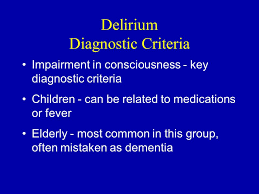Results: The Great Pretenders -- Illnesses That Mimic Other Illnesses
Published on 11/16/2018
QUESTIONS
GO to COMMENTS
Comments
1.
1.
Science is a weird and wondrous thing. Sometimes illnesses can actually mimic other illnesses, causing misdiagnosis and confusion. One diagnosed condition -- dementia, is often presented in senior patients as just that, when in fact it can be a totally different, curable or treatable condition. Here are just a few of the many medical conditions that can be easily confused with dementia, and could cause significant delays in treatment or diagnosis. How many of these were you aware of?

Delirium shares with dementia the features of confusion, disorientation, and memory impairment. Delirium looks very different, though, in other ways. It comes on rapidly, often after a medical or surgical event or toxic combination of medications. It is accompanied by shifting alertness, resulting in moments of sleepiness alternating with moments of agitation. Delirium is more often associated with visual hallucinations or psychotic delusions than dementia. And, most importantly, delirium can often be reversed once the cause is found and treated.
22%
512 votes
A head injury from a fall, even one that seemed less serious, can be followed by significant cognitive problems. When this is due to a concussion, symptoms usually improve over time with supportive care. A limited post-traumatic bleed inside the skull can interfere with cognitive functioning by leading to a collection of blood called a subdural hematoma.
38%
862 votes
Another condition that can create cognitive impairment is normal pressure hydrocephalus (NPH), a disorder in which cerebrospinal fluid accumulates in the ventricles (cavities) of the brain and interferes with thinking, memory, walking, and control of urination.
10%
229 votes
Sensory limitations, too, can create a picture like cognitive impairment that worsens as the affected person becomes increasingly isolated as a result of hearing or vision problems. Recent research has emphasized that there is a relationship between hearing loss and the risk for development of cognitive impairment.
11%
242 votes
Sensory limitations, too, can create a picture like cognitive impairment that worsens as the affected person becomes increasingly isolated as a result of hearing or vision problems. Recent research has emphasized that there is a relationship between hearing loss and the risk for development of cognitive impairment.
9%
200 votes
Diseases of the kidney or liver can result in an accumulation of toxic metabolic waste products in the blood, dulling the mind or poisoning mental activity and sometimes resulting in dementia.
15%
339 votes
Disorders of the endocrine organs, responsible for making hormones that are transported through the bloodstream in order to control many metabolic activities, are additional causes of dementia-like symptoms. An excess or deficiency of thyroid hormone interferes with thinking. Disturbances in the regulatory effects of insulin, a hallmark of diabetes mellitus, harm cognition along with other bodily functions.
9%
197 votes
Some infections produce a prolonged change in mental functioning that lacks signs clearly linked with delirium. Lyme disease, syphilis, or HIV for example, are capable of mimicking dementia
16%
355 votes
Heavy metal toxicity, too, can create more stable changes that could go unrecognized without specific testing.
16%
363 votes
Cancers of various types can affect cognition through brain tissue destruction, increased pressure within the head, or sometimes even through producing chemicals that travel from various parts of the body through the blood stream to the brain where they create havoc.
16%
368 votes
Knew about all of these
9%
215 votes
Knew about none
43%
988 votes
2.
2.
Attention deficit hyperactivity disorder (ADHD) is one of the most often mis-diagnosed conditions in both children and adults. There are no brain scans, blood tests, or anything else definite that is used during diagnosis. The problem with this is there are many other problems that have the same symptoms of ADHD and these are often over-looked. Here is just a partial list of all other conditions that often mimic ADHD. How many did you know about already?

Hypoglycemia (Low Blood sugar) Low blood sugar can stem from thyroid disorders, liver or pancreatic problems, or adrenal gland abnormalities, or even an insufficient diet. Hypoglycemia can display the same ADHD like sypmtoms.
20%
448 votes
Allergies: 15 to 20 percent of the world has some type of allergy. A person can be allergic to nearly anything so check for all forms. Food is one of the primary causes of allergic reactions. Just like the Car and human analogy stated above. If a child eats food they are allergic to, the body will not run properly and that may affect behavior. Everyone has different sensitivities to allergens so just because you aren't affected does not mean your child won't be also. (Some examples, Allergic reactions to food dye, milk, chocolate, and grains, ect)
22%
502 votes
Learning disabilities: If the primary place of behavior problems is at school, learning disabilities may be the cause of ill behavior. One of the main things that affect a child's self-esteem is how well they do in school. If a child has an undiagnosed learning disorder that makes school much harder and sometimes impossible. Children with undiagnosed learning disabilities are labeled as lazy, stupid, and many other downgrading opinions that affect self-esteem. And many times when a child's self-esteem is at jeopardy they try to make up for it in other sometimes-nonproductive ways such as acting out, bullying, or becoming the class clown.
31%
697 votes
Hyper or hypothyroidism: An imbalance in metabolism that occurs from an overproduction or underproduction of thyroid hormones. This imbalance may cause a variety of behaviors and may affect all body functions.
19%
423 votes
Hearing and vision problems: If a child can't see or hear properly, school and daily things in life are nearly impossible and it may cause ADHD like symptoms especially in educational settings.
20%
466 votes
Spinal Problems: Some spinal problems can cause ADHD like symptoms because if the spine is not connected to the brain properly nerves from the spinal cord can give the brain all of signals at once making a child rambunctious and always on the go
5%
124 votes
Carbon Monoxide poisoning : Thousands of children each year are exposed to toxic levels of this gas each year. Sources include gas heaters, and other gas appliances such as fireplaces, dryers, and water heaters.
13%
286 votes
Seizure disorders: The most overlooked is the absence Seizures. During an absence seizure, the brain's normal activity shuts down. The child stares blankly, sometimes rotates his eyes upward, and occasionally blinks or jerks repetitively, he drops objects from his hand, and there may be some mild involuntary movements known as automatisms. The attack lasts for a few seconds and then it is over as rapidly as it begins. If these attacks occur dozens of times each day, they can interfere with a child's school performance and be confused by parents and teachers with daydreaming.
14%
309 votes
Knew about all of these
10%
232 votes
Knew none of these
43%
981 votes
3.
3.
Here are just a few other diseases that mimic other diseases. How many of these were you familiar with?

Lupus is a challenging disease to diagnose, often misdiagnosed as Multiple Sclerosis, rheumatoid arthritis, fibromyalgia, hypothyroidism, skin conditions such as rosacea , melasma, psoriasis, eczema (atopic dermatitis), and facial seborrheic dermatitis, depression, and various viral and bacterial infections, including Lyme Disease
25%
566 votes
Strokes can often be misdiagnosed and early intervention is always key. Conditions from seizures, migraines to multiple sclerosis can make you feel confused, dizzy, weak in the arms, or have trouble seeing, speaking, or moving. In case of a stroke, the earlier you act, the better.
28%
650 votes
Inflammatory bowel disease (IBD) is a diagnosis of exclusion and requires ruling out infectious causes that may mimic IBD, such as esophageal infection, ulceration, or inflammation
15%
351 votes
Multiple sclerosis is a tough disease to diagnose because there is no single diagnostic test to establish a definite MS diagnosis, and also because there are many diseases which manifest symptoms similar to MS, such as Sjögren's Syndrome, Myasthenia Gravis, Lyme disease, Human T-cell lymphotrophic virus-1 and many more.
20%
447 votes
Knew about all of these
13%
298 votes
Knew none
46%
1056 votes
4.
4.
In summary, often diagnosis is not as simple and obvious as one would hope, but patience, second opinions and perseverance to ensure the correct diagnosis is key. Trust your gut, and do your own research. Switch doctors if you are not happy, and talk to others who have had similar experiences. In the end, you are your own best advocate. Have you ever had a hard time getting diagnosed correctly?

Have not been in this situation
30%
674 votes
Yes, I have
29%
665 votes
No, I have been happy with my medical attention
34%
774 votes
I am actually going through that now
7%
170 votes
COMMENTS


